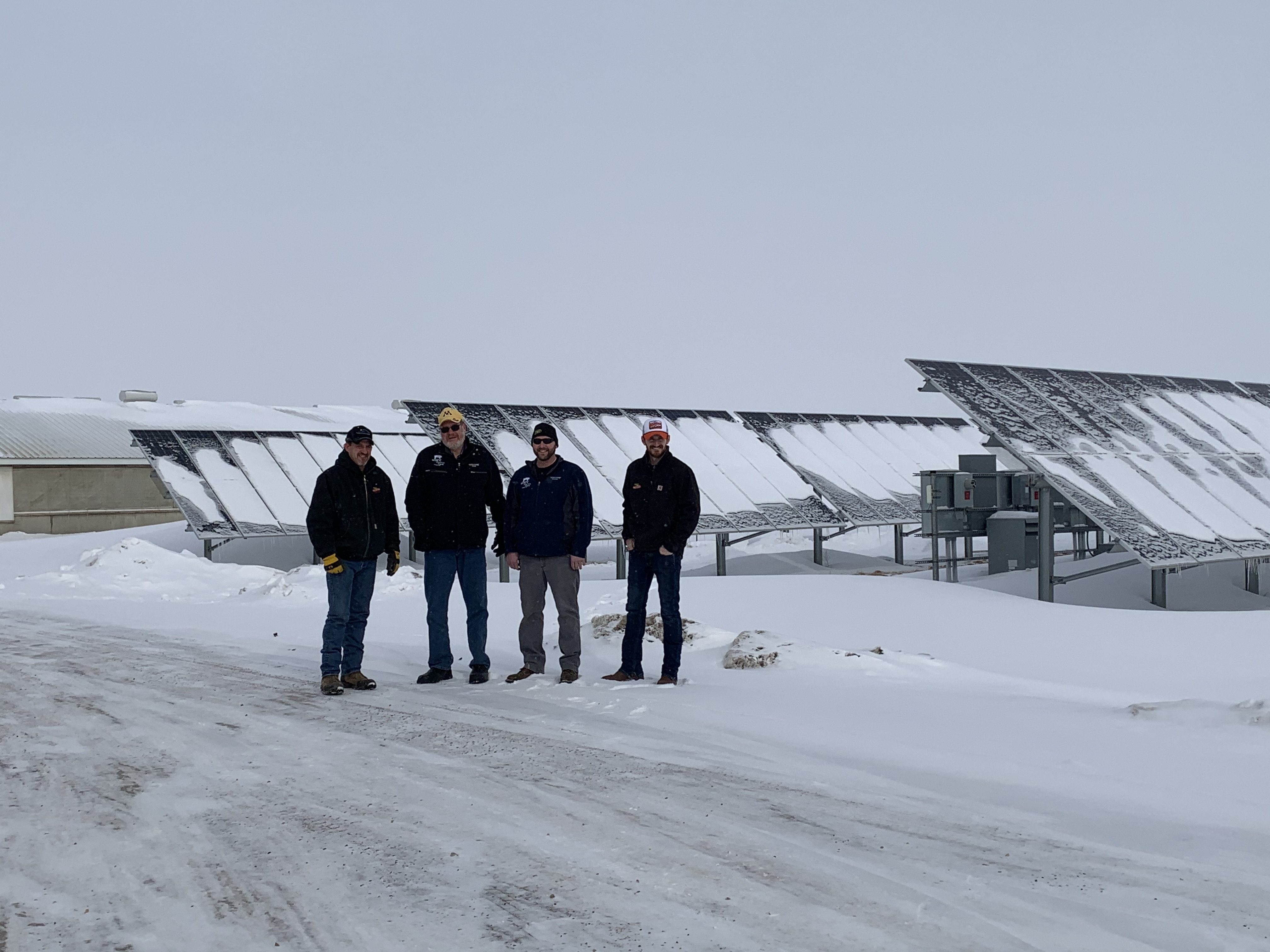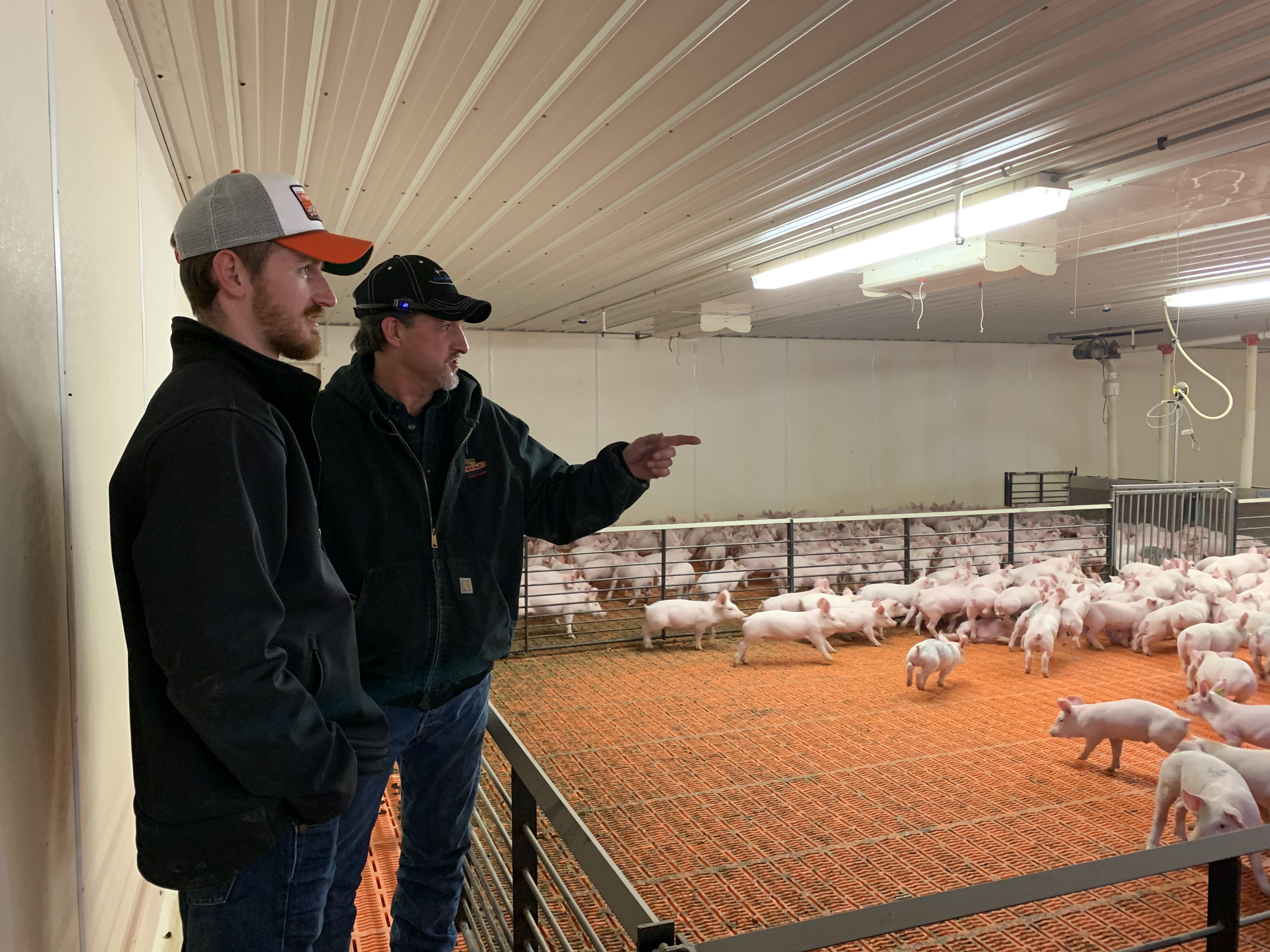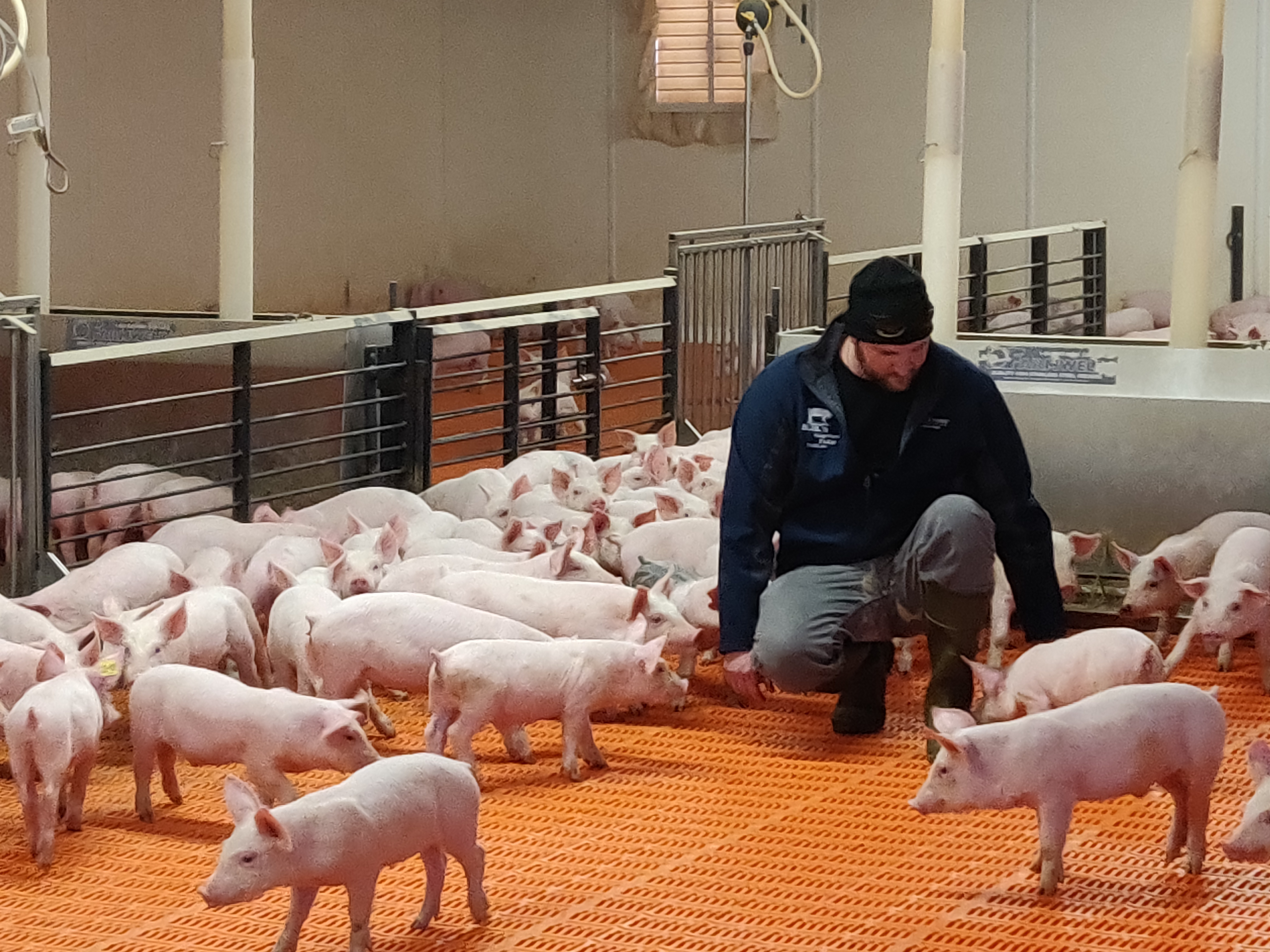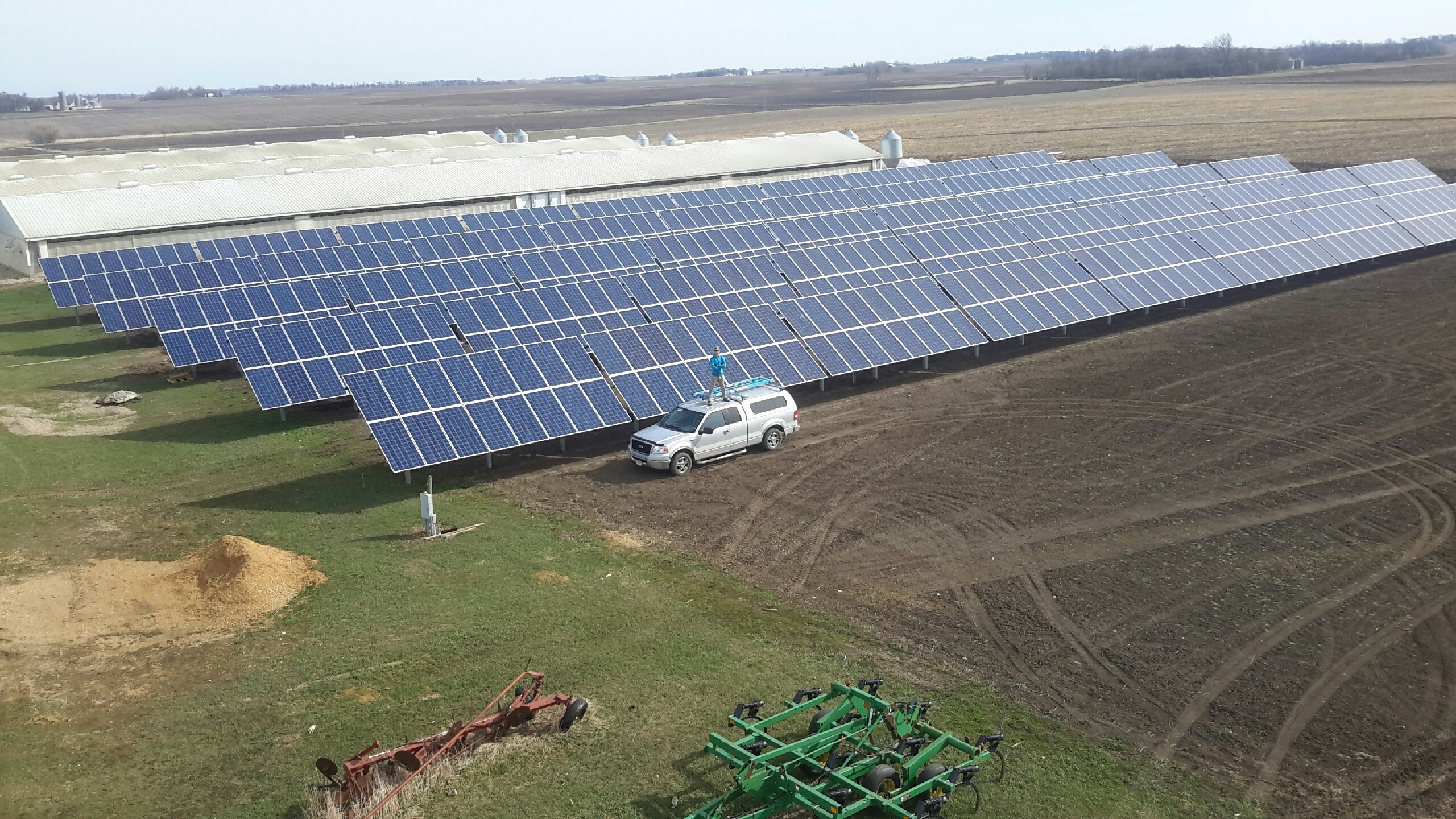“Utilizing the corn they grow in their on-farm feed mill, monitoring and reducing antibiotic usage and educating their communities on swine production practices, Buhl’s Ridgeview Farms is at the forefront of sustainability,” said Emily Scholtz, PIPESTONE Nutritionist.
Purchasing their first sows in 1976, Don and Susan Buhl operate Buhl’s Ridgeview Farm of Tyler, Minnesota. Since the beginning, the couple has continued to grow and improve their operation. Today, Don and Susan Buhl, along with owners, Kary Wichmann and Josh Wieme, operate a successful farrow-to-finish operation, marketing nearly 55,000 hogs per year.
“Buhl’s Ridgeview Farms works diligently to control input costs and volumes,” said Dr. Joseph Yaros, PIPESTONE Veterinarian. “They challenge themselves continually to minimize expenses and improve feed conversions to be as sustainable as possible. With two of their sites having solar panels, they are well in line with a focus on sustainability.”
The following are a few examples of why Buhl’s Ridgeview Farm is a key player in sustaining the pig farm of tomorrow:
Growth
“I have always liked pigs,” Don said. “I got my first pig when I was 12. It was my FFA project that put me through college. When I came back to the farm, all I wanted to do was raise pigs and do it the best way possible.”
Don started with a few sows in the yard in 1976 and has continued to grow ever since.
“It is amazing how efficient a pig is and how fast they grow,” Don said. “We have taken the amount of feed, water and land to raise a hog and reduced it greatly over the years. It is a tremendous accomplishment that the industry has been making sustainability improvements for 30-40 years already.”
Austin Wichmann, farm employee since 2018, agreed.
“I enjoy watching the pig come in at 15 lbs and watch it go out the door at 290,” Austin said. “It is not only rewarding to know you raised that animal, but have the opportunity to look at records to know how you did with that group and how you can improve moving forward.”
“It is rewarding and gratifying to look back at the operation you have grown,” Don said. “It is fun now to share this opportunity with some younger people. I hope the guys can have a good opportunity here and make the farm even better.”
Generational Transition
Since farming his entire life, Don has decided to transition the farm to his employees in hopes they carry on a successful operation.
“Don treats me like a son of his,” Josh said. “Don and Kary hired me when I was in high school and gave me an opportunity to grow, building my own barn a few years ago. Without Don’s support, it would not have been possible.”
Nutritionist, Emily Scholtz notes, “I think the dynamics within the Buhl’s Ridgeview crew makes them unique. Each person focuses in a different area, but works together to help the operation be successful and continue for the next generation.”
“My advice to you is to start transitioning now,” Don said. “It takes a long time to find the right people and make the transfer. I have spent 30 years building this operation, but I know it will take 10 or more years to transition it. If you want to call the sales barn, that is easy. But if you want to continue, it is more complicated. How you arrange things can create a large opportunity for others in the future.”
Responsible Antibiotic Use
“We are using less antibiotics on our operation than is typical for our peers,” Don said. “We use it when necessary, but we don’t when it is not. If you do a good job at keeping your barns at the right temperature and keep your pigs healthy, you decrease antibiotic use and remain more sustainable.”
Kary is also cautious of the farms antibiotic use and feels that through learning when to use antibiotics and which ones to use, the farm has greatly decreased their antibiotic usage on farm.
Utilizing Manure
Hauling their own manure with an applicator, Buhl’s are taking the nutrients from their hogs, back to the corn they use to feed them.
“When I started farming, we had pigs on cement,” Don said. “When it rained hard, we didn’t have to clean the lots. The manure went somewhere, but it was not necessarily where it was supposed to go. All our manure today is contained until we put it on crop ground.”
“We take manure tests to see what nutrients are available,” Josh said. “We apply the manure nutrients results to the results of soil samples. This allows us to apply the right amount of nutrients required by our crops.”
Solar Panels
Roughly 5 years ago, Buhl’s added a solar garden to produce electricity from sunlight. The garden is part of the grid, producing electricity for the farm and for others.
“Right now, our solar garden produces more electricity than we need for ourselves,” Don said. “As we are a part of the grid, we still have electricity at night when there is no sun, but during the day when we have more than we need, we are able to sell it.”
The solar garden is a renewable source of energy, providing the farm with all electricity necessary for their operation.
“There are no emissions from this solar garden,” Don said. “As we are using sunlight and not carbon to produce this electricity, we are supporting the environment.”
The on-farm shop is also heated by a geothermal system, no propane is used for heating.
“Sustainability means maintaining a standard that sets yourself up for success in continuation,” Austin Wichmann said. “Moving forward, I need to have the same mentality. Set the bar and continue to get better every day.”
“Working with PIPESTONE has allowed us to associate with like-minded people who want to get better both individually and together,” Don said.
Don and Susan were initial shareholders in Hiawatha, a sow farm managed by Pipestone Management. Today, they work alongside PIPESTONE through marketing with Big Stone Marketing, utilizing record keeping services to benchmark themselves amongst other producers, purchasing products through Pipestone Veterinary Services, buying products and consulting services through Pipestone Nutrition, working alongside a Veterinarian through PigVet, and as a shareholder in multiple sow farms managed by Pipestone Management.
“As our operation continued to grow, PIPESTONE grew alongside us,” Don said. “Every time we look into new opportunities, PIPESTONE helps us. This beneficial relationship has made us better, and when your operation is better, your farm is more sustainable.”
Article by: Abby Hopp, Marketing Coordinator




